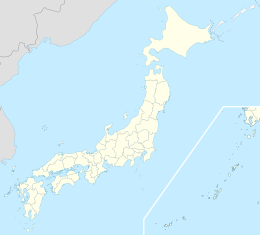Ōmishima Island (大三島, Ōmishima) is the largest island in the Geiyo Islands chain, and the westernmost island on which the Nishiseto Expressway, which links Honshu and Shikoku via a number of islands, runs. It is located in the Seto Inland Sea. The island's highest peak is Washigatozan (鷲ヶ頭山) at an altitude of 437 m (1,434 ft).
Native name: 大三島 Ōmishima | |
|---|---|
 Miyaura port | |
| Geography | |
| Location | Seto Inland Sea |
| Coordinates | 34°14′39″N 133°00′35″E / 34.244139°N 133.009627°E |
| Area | 64.54 km2 (24.92 sq mi) |
| Length | 12.8 km (7.95 mi) |
| Width | 6.2 km (3.85 mi) |
| Coastline | 88.8 km (55.18 mi) |
| Highest elevation | 437 m (1434 ft) |
| Highest point | Washigatozan |
| Administration | |
Japan | |
| Prefecture | Ehime |
| City | Imabari |
| Demographics | |
| Population | 4963 (2020) |
| Pop. density | 77/km2 (199/sq mi) |
| Ethnic groups | Japanese |
Population
editThe population as of the 2020 census was 4,963 - 2,299 men, and 2,264 women.[1]
Geography
editŌmishima is kidney-shaped and together with Ōsakikamijima on the west encloses the calm bay of Utena, where the primary seaport of Miyaura is located. The island's Utena Dam reservoir is the primary freshwater source for Ōmishima itself and the nearby Hakata.
History
edit- 1541 - Tsuruhime fights Ōuchi Yoshitaka fleet
- 1874 - post office established
- 1979 - Ōmishima bridge connecting to Ehime Prefecture complete[2]
- 1999 - Tatara Bridge connecting to Hiroshima Prefecture complete[3]
- 16 January 2005 - several towns (including Ōmishima, Ehime) and villages on the island were merged into the city of Imabari, Ehime, along with towns and villages on other surrounding islands.
Climate
edit| Climate data for Ōmishima (1991−2020 normals, extremes 1978−present) | |||||||||||||
|---|---|---|---|---|---|---|---|---|---|---|---|---|---|
| Month | Jan | Feb | Mar | Apr | May | Jun | Jul | Aug | Sep | Oct | Nov | Dec | Year |
| Record high °C (°F) | 16.0 (60.8) |
20.2 (68.4) |
25.4 (77.7) |
27.9 (82.2) |
30.4 (86.7) |
33.7 (92.7) |
38.0 (100.4) |
37.4 (99.3) |
36.1 (97.0) |
31.9 (89.4) |
24.1 (75.4) |
20.4 (68.7) |
38.0 (100.4) |
| Mean daily maximum °C (°F) | 9.6 (49.3) |
10.2 (50.4) |
13.4 (56.1) |
18.6 (65.5) |
23.2 (73.8) |
26.1 (79.0) |
30.0 (86.0) |
32.0 (89.6) |
28.3 (82.9) |
22.8 (73.0) |
17.2 (63.0) |
12.0 (53.6) |
20.3 (68.5) |
| Daily mean °C (°F) | 5.5 (41.9) |
5.6 (42.1) |
8.4 (47.1) |
13.1 (55.6) |
17.6 (63.7) |
21.3 (70.3) |
25.3 (77.5) |
26.8 (80.2) |
23.4 (74.1) |
18.0 (64.4) |
12.5 (54.5) |
7.7 (45.9) |
15.4 (59.8) |
| Mean daily minimum °C (°F) | 1.3 (34.3) |
1.1 (34.0) |
3.4 (38.1) |
8.0 (46.4) |
12.7 (54.9) |
17.6 (63.7) |
22.0 (71.6) |
23.2 (73.8) |
19.7 (67.5) |
13.8 (56.8) |
8.2 (46.8) |
3.4 (38.1) |
11.2 (52.2) |
| Record low °C (°F) | −5.9 (21.4) |
−6.2 (20.8) |
−4.4 (24.1) |
−1.5 (29.3) |
3.6 (38.5) |
9.6 (49.3) |
15.5 (59.9) |
15.6 (60.1) |
11.1 (52.0) |
5.5 (41.9) |
−1.3 (29.7) |
−3.5 (25.7) |
−6.2 (20.8) |
| Average precipitation mm (inches) | 40.8 (1.61) |
54.0 (2.13) |
89.5 (3.52) |
98.0 (3.86) |
116.2 (4.57) |
186.3 (7.33) |
194.6 (7.66) |
93.5 (3.68) |
133.4 (5.25) |
96.3 (3.79) |
66.0 (2.60) |
50.1 (1.97) |
1,218.6 (47.98) |
| Average precipitation days (≥ 1.0 mm) | 5.3 | 6.7 | 9.0 | 8.9 | 8.7 | 11.1 | 9.4 | 6.7 | 8.8 | 7.3 | 6.4 | 6.0 | 94.3 |
| Mean monthly sunshine hours | 146.1 | 151.2 | 182.0 | 200.2 | 214.7 | 157.1 | 201.2 | 233.9 | 171.2 | 180.4 | 159.2 | 144.3 | 2,141.6 |
| Source: JMA[4][5] | |||||||||||||
Transportation
editŌmishima is connected to the mainland of Honshu and Shikoku islands by the bridges of the Nishiseto Expressway (Shimanami Kaidō). A ferry is also available from the island to Ōsakikamijima, Okamura Island and Ōkunoshima (Rabbit Island). Ōmishima Island is served by the national Route 317.
Attractions
edit- The salt factory[6]
- Historical and marine museum[7]
- Ōyamazumi Shrine
- Toyo Ito Museum of Architecture, Imabari
- The entire Ōmishima Island is designated as a National Place of Scenic Beauty
Notable residents
edit- Shozo Fujita - historian
- Tsuruhime - priestess and warlord
External links
editReferences
edit- This article incorporates material from Japanese Wikipedia pages 大三島 and 大三島町, accessed 13 September 2017
- ^ https://www.city.imabari.ehime.jp/simingamannaka/tokei/r03/02.pdf
- ^ Ohmishima Bridge at Honshū Shikoku Bridge Authority
- ^ Tatara bridge at Honshū Shikoku Bridge Authority
- ^ 観測史上1~10位の値(年間を通じての値). JMA. Retrieved 1 March 2022.
- ^ 気象庁 / 平年値(年・月ごとの値). JMA. Retrieved 1 March 2022.
- ^ Hakata no Shio Factory
- ^ Museum of Oomishima
